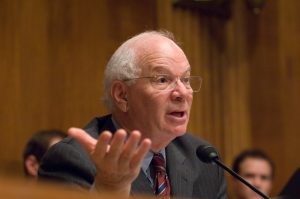 Monday, October 8, 2012
Monday, October 8, 2012
I don’t know about you, but I think there’s too much at stake to settle for re-electing an incumbent whose recent history in office has been mediocre at best.
A local paper serving the Maryland suburbs of Washington, DC has endorsed Senator Ben Cardin’s bid for re-election to his second term. I know this publication and, in the spirit of full-disclosure, I have an op/ed piece in the same edition. While it’s no secret that I am not in favor of re-electing Senator Cardin, this editorial endorsement that ran in Friday’s paper gives me an opportunity to list the reasons I’m opposed to his candidacy in a more succinct way than I have done before. Nothing overly clever here. Just a simple list, in contrast to what the endorsement had to say.
Please keep in mind that, while I disagree with the editorial’s arguments and conclusion, I respect its point of view. What we have here is nothing more than an honest difference of opinion, the old-fashion kind we can make, but then still go out for a beer that evening.
First, here are excerpts from the endorsement that describe its major points:
1. “U.S. Sen. Benjamin L. Cardin, by virtue of his tenure serving the public and his experience on a number of key committees in both the House and Senate, has earned the label of a respected statesman.”
2. “Cardin (D-Md.) of Pikesville has voiced frustration at the divisiveness in the current Congress and has displayed a willingness to work across the aisle.”
3. “Cardin’s influence, which benefits Maryland, is evidenced by his committee assignments, which include Finance, Foreign Relations, Budget, and Environment and Public Works (he chairs the Water and Wildlife Subcommittee). …In his latter role, he has been a leading advocate on water quality issues.”
4. “At a time when all political candidates talk of what they would do to help small businesses, Cardin, a member of the Small Business and Entrepreneurship Committee, is positioned to actually do something.”
5. “In 2004, Worth Magazine listed him as among the ‘100 people who have influenced the way Americans think about money.’”
6. “…Cardin remains the best hope for Maryland’s electorate. Besides being the most experienced candidate, he brings a willingness to work with others, an understanding of the scope of problems facing the United States – including legislative gridlock and the economy — and compassion for his fellow citizens.”
Almost needless to say, this editorial and I see the Senator very

differently. Here’s what I think, including two observations the editorial failed to make.
1. “By virtue of his tenure…” No question about it, Senator Cardin is a career politician, having been in the House for 20 years before being elected to the Senate six years ago, and in the Maryland House of Delegates before that. The editorial thinks this is a good thing. I’m not so sure. After 26 years in the House and Senate, I think it’s safe to say that Senator Cardin has become part of the Washington political system, more of a reason why public respect for Congress is at record lows, than a person who has struggled to make Congress productive. More of a follower than a fixer.
2. “…has displayed a willingness to work across the aisle.” That’s interesting. All politicians and their supporters say that, but how do we really know? A willingness to do something is one thing. Actually doing it is something else altogether. If only there was a more or less objective indicator of cross-the-aisle cooperation and compromise. Turns out, there is.
As a Senator, Ben Cardin has voted for his President’s and his party’s programs 97%, 98% and 97% of the time in the 110th, 111th and 112th Congresses. (As a US Senator in the 110th Congress, President Obama himself only voted his party’s line 96% of the time.) You would think that a true statesman, as opposed to a rigidly biased, rubber-stamping proponent of his party’s ideology, would have occasionally voted with the other side. I mean, if Senators on their respective sides of the aisle always voted 98% of the time for their own party’s proposals, nothing would ever get done, would it?
3. “…has been a leading advocate on water quality issues.” Every Congressman/woman and Senator has two obligations. One is to represent their constituents in the making of national law, legislation that protects all of us regardless of the state in which we live. The other, more political objective is to push their way into that bargain basement sale and bring as much merchandise as they can home to the people who voted for them. “Screw America, the country. This is the part of government that is all about me, my state or my district.” Words to that effect.
Has Senator Cardin’s work on legislation related to the Chesapeake Bay been beneficial to Marylanders? Absolutely. Did the work he did benefit other bodies of water around the country? Of course. Does everything a Senator does have to be of momentous or historic importance? No. The problem is, Senator Cardin didn’t do anything else that advanced the solutions we so desperately need in order to resolve the most critical economic, fiscal and social issues of our time. Nothing. Go on-line and check the Senator’s legislative record for yourself.
Perhaps even more important, he exhibited a profound lack of legislative productivity, period. In the almost six years he has been in office, Senator Cardin has offered 105 pieces of legislation, only three of which were actually signed into law. The most recent was a June 2010 bill to amend the Federal Water Pollution Control Act. The one before that was in June of 2007 to grant a federal charter to the Korean Veterans Association. And the other one was in April of 2007, a bill to reform mutual aid agreements for the National Capital Region. That’s it. Three relatively unimportant pieces of legislation in almost six years in the Senate during a time of profound economic crisis for his country and state.
4. “…is positioned to actually do something.” (I can’t believe the editorial’s choice of words here, including, in particular, “actually.”) The argument seems to be that Senator Cardin has spent his first six years in the Senator getting ready for this next six years. Really? How much time does the Senator, who we’re paying $174,000 per year, plus benefits, need before he becomes productive? What happened to the editorial’s argument that Senator Cardin’s so experienced? With all that experience, shouldn’t he have been savvy enough in 2006, when we first sent him to the Senate, to hit the ground running, legislatively speaking?
5. “In 2004, Worth Magazine listed him as among the ‘100 people who have influenced the way Americans think about money.’” For one thing, 2004 was eight years ago, two years before Congressman Cardin would be elected to the Senate. He’s not running for Congress in 2004. He’s running for a second term in the Senate in 2012.
For another thing, to quote from the “About” section of www.Worth.com, their objective is to “better enlighten, inspire and serve a select group of high net worth individuals with an avid interest in the intelligent stewardship of their personal wealth.” So, exactly why does this magazine’s opinion count for most Marylanders?
Third, I think it’s a bit overstated to say that Senator Cardin has “influenced the way Americans think about money.” Just a tad. (My apologies for the sarcasm.) Is this really one of the best points the editorial could make to endorse Senator Cardin’s re-election? If I were Senator Cardin, I’d be embarrassed, at least politically, if not sincerely, to have been so honored by this magazine.
6. “…Cardin remains the best hope for Maryland’s electorate.” The point of this language from the editorial is that the writer doesn’t consider Senator Cardin’s opponents to be viable alternatives. The editorial dismisses both Republican Dan Bongino and Independent Rob Sobhani because they’ve never held elective office. From my point of view, given the mess that Congress has become, that might actually be a good thing. Dan Bongino is further rejected for his Tea Party leanings, and Rob Sobhani for his making promises without sufficient detail. (At least he has a plan.)
I agree that Dan Bongino is too right of mainstream Marylanders to represent them effectively, and too inexperienced to have a good, practical understanding of the government programs and legislation we need. Rob Sobhani, on the other hand, is perfectly qualified, and then some, to replace Senator Cardin.
Those are my responses to the editorial’s six main arguments, and I have two additional points to add, reasons not to re-elect Senator Cardin:
7. The first is a comment, not about his age per se, but his likely career path. Senator Cardin turned 69 on October 5. (“Happy Birthday!” I mean that sincerely. My comments have never been about you personally, if you’re reading this, but only about your professional history and qualifications for re-election.) A second six-year term in the Senate may very well be his last before he retires. This would, in other words, be his lame duck term. He could either use the fact that he no longer needs to raise special interest money to get re-elected, and has no need to get re-elected period, to legislate like crazy to solve our major problems, or – and this is what I’m worried about – spend the next six years taking a pre-retirement victory lap.
8. My second additional point is about Senator Cardin’s addiction to taking special interest money to finance his campaigns, a practice I find, quite frankly, reprehensible. In 2006, when he ran for the Senate the first time, his FEC reports show him having raised a total of $1,480,090 from non-party PACs. In 2008, which was not an election year for Senator Cardin, his campaign raised another $188,850. Then $267,300 more in 2010.
So far this election season, through his campaign’s June 30 FEC report, he’s raised another $1,669,919 from special interests, some of those contributors being associated with industries related to his Senate committee assignments. He has, for example, received $563,946 from various health services PACs, probably because he’s on the Senate Subcommittee on Heath Care. It is an entirely reasonable question to ask what these special interests expect and are getting for their investments in the Senator’s campaigns. Total special interest money his campaigns have received since running for the Senate in 2006: $3,606,159.
Of the two principal candidates running to unseat Senator Cardin, Independent Rob Sobhani would seem, to me, to be the best choice. No matter what, whichever challenger you prefer, Senator Cardin’s performance in the Senate has failed to justify his re-election. Unless you sincerely believe that neither one of his opponents can do a better job representing Maryland, you can’t reward Senator Cardin’s lack of productivity and his taking of special interest money by voting to return him to the Senate for another six year term. Six years is a long time, a big chunk of your and your family’s lives. Ask yourself, how old are you now? How old will you be when the Senator’s next term is over? What do you want your government to accomplish in the meantime?
What message does re-electing Senator Cardin send to our elected officials? That they can do less than nothing, and then be re-elected for no other reason but that they are already in office? Does re-electing a mediocre representative give us the government we want and deserve, or does it make more sense for us to politely thank Senator Cardin for his service and give someone with a fresh mandate a chance to do better?
-Next Contestant

